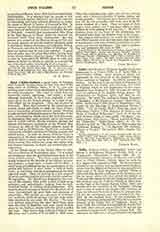

Coffin (alias HATTON), EDWARD, English Jesuit and missionary, b. at Exeter, 1570; d. April 17, 1626, at Saint-Omer’s College. After studies at Reims and Ingolstadt, he was ordained at the English College, Rome, and sent to England. In 1598 he entered the Society. On his way to the novitiate in Flanders, he was seized by the Dutch, near Antwerp, and taken to England, where he was imprisoned for five years. Banished from England in 1603, he acted for twenty years as confessor at the English College, Rome. He volunteered for England again, but died on the journey. He wrote the preface to Father Persons’s “Discussion of Mr. Barlowe’s Answer” (Saint-Omer, 1612); Refutation of Hall, Dean of Worcester’s “Discourse for the Marriage of Ecclesiastical Persons” (1619); “Art of Dying Well”, from the Latin of Bellarmine (1621); “True Relation of Sickness and Death of Cardinal Bellarmine”, by C. E. of the Society of Jesus (1622), tr. into Latin, “De Morte”, etc. (Saint-Omer, 1623, 8vo.); “Marti Antonii de Dominis Palinodia” ( Saint-Omer, 1623), tr. by Dr. Fletcher in 1827 as “My Motives for Renouncing the Protestant Religion“; “De Martyrio PP. Roberts, Wilson et Napper” (Stonyhurst MSS., Anglia, III, n. 103).
PATRICK RYAN

